Every business owner strives to promote a product or service free of charge while aiming for the promotion to reach out to a broad audience of niche-related people. So, how to meet the requirements of these two conditions simultaneously?
The answer is simple – use earned media channels for this purpose. In this guide, you will learn about the most popular earned media channels and how to get the most of them.
Shall we begin?
Three Basic Types of Media

There are three main types of media – paid, owned, and earned. Each of these types has its specific nuances you will have to take into account. Now, let’s review these types one by one.
Paid media includes channels of promotion that cost money. Among these channels are sponsorship, billboards, online paid ads, TV/radio advertising. Owned media embraces all the assets you take under control personally – content on your blog, newsletter, etc.
You might be wondering if SEO belongs to the earned or owned type of media? Here’s the thing. SEO stands for both media channels. Do you want to know why? The only way to rank in Google for business-related keywords is by creating content, and that content belongs to owned media.
However, you don’t have any power over rankings. It depends on third-party sources on how your content will rank in search. Therefore, it belongs to earned media. To conclude, you can keep paid and owned media channels under control, but you don’t have any influence on earned media.
Why Does Earned Media Matter

By the sound of things, earned media is one of the most attractive channels of promotion. Every business owner wants to see the growth of customers acquired through earned media. So, why does earned media matter?
- It isn’t costly (in a long-term game)
Earned media requires some time before you will get the first positive results. If you want to get quick results, you should use paid media channels. However, once you stop paying, all the results will start fading.
- It builds brand awareness
Earned media allows consumers to share their feedback about your product or service independently, which is priceless. Moreover, earned media has more trust credits in contrast to paid media.
Five Examples of Earned Media
Likely, earned media is rich on the channels where you can promote your business free of charge. Let’s run through five examples of earned media channels.
- Google channel
For instance, the Respona blog drives 20.8K organic visits monthly. All these visits come from search engines without the help of paid advertising. How is it possible?

Respona blog suggests high-quality content that Google ranks well. Therefore, it helps Respona get promotions for free and lets more people know about its toolkit.
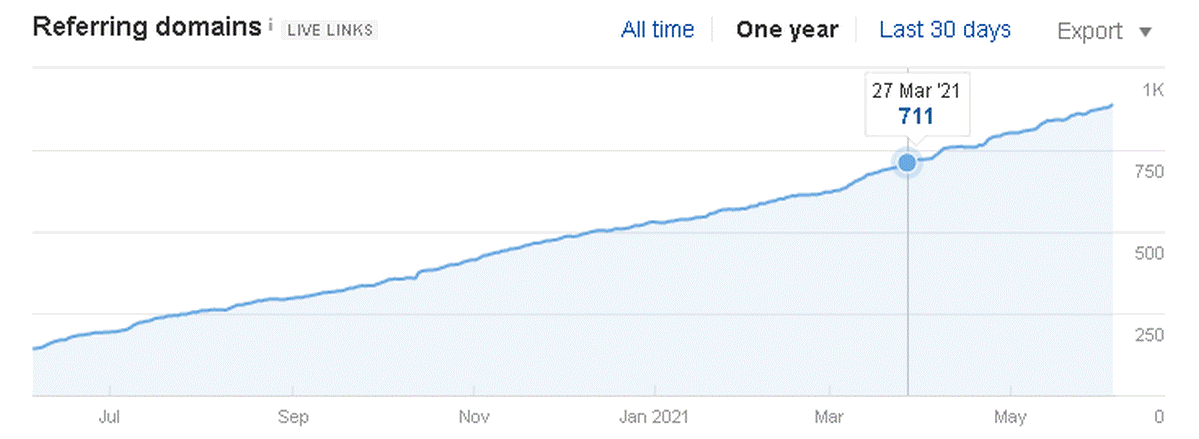
- Review websites
Clever consumers tend to read service reviews across review websites. They get honest feedback regarding the tools they are interested in.
There are lots of niche-related review websites on the web. For example, G2 is the website to find reviews on whatever software or service you want.
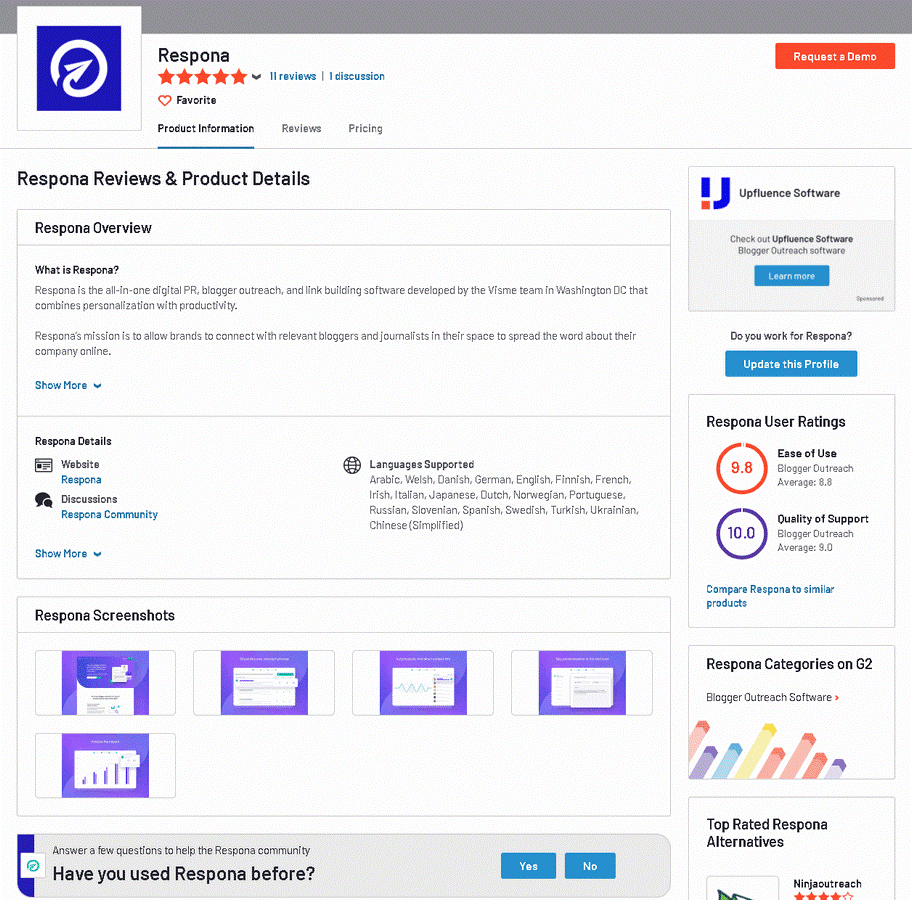
If you’re searching for a social media channel to promote your brand for free, draw your attention to Twitter. With the help of tweets, your brand, product, or service can get positive feedback from other users in a blink of an eye.

- Influencers
By building business relationships with influencers, you will have a chance to promote your brand heavily. Influencers have a massive army of followers, and they listen to what influencers say.
Thus, if a specific influencer says that your tool rocks compared to other online business tools, followers will be more likely to believe them.
How to Get Earned Media
Earned media is outside of your control. Nevertheless, you can have an impact on it. Therefore, here are seven channels that can help you get earned media.
1. Source Keywords Ranking
It is possible to build brand awareness on other web resources by publishing your data. However, it works under two conditions:
- If you pitch these resources with unique data
- if you know how to introduce your data to the right journalists
There is an actionable way to meet these two conditions – rank for the source keywords. But, wait, what are source keywords?
Source keywords are associated with terms that journalists explore to find data they will refer to in the writing materials. To find these keywords, journalists use the following search commands:
- [topic] statistics
- [topic] data
- [topic] facts
- [topic] figures
The question is, how can you find these source keywords? Use SEO tools for this purpose. In this case, Ahrefs’ Keywords Explorer can analyze a couple of target niche-related keywords with this tool. The report you should draw your attention to is called “Matching terms” and switch to a “Phrase match” mode – filter the results by using the “Include” tab with the words “data,” “statistics,” “facts,” etc.
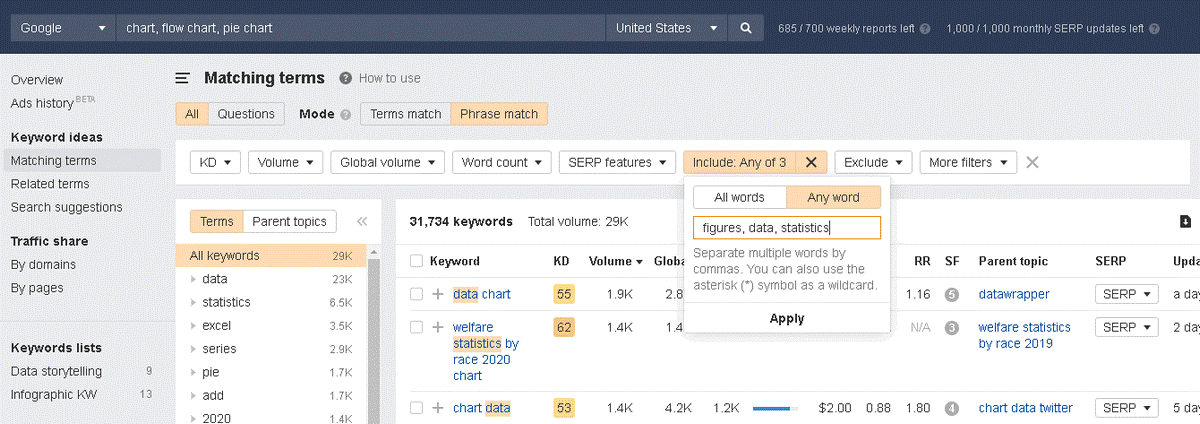
Run through this list and catch a few keywords. Afterward, optimize your content using them. The next step is to research resources where your competitors have published their content. Pitch these web resources with your newly updated data and get backlinks in return. It will help you rank for these source keywords in Google.
2. SEO
SEO helps with content optimization, and you will be able to have some impact on ranking. It is a multi-tasking process that consists of:
- Keyword research (explore potential niche-related topics that you can use for content optimization) – you can use MozBar to conduct keyword research. The MozBar is a browser extension that offers unlimited search queries. See this tutorial explaining how to get into MozBar
- Content writing (create content with SEO in mind)
- Build backlinks (link building helps increase the power of your backlink profile)
3. Podcasting
Nowadays, different niche experts are becoming guests across various podcasts. They share their expertise in particular fields while the listeners enrich themselves with information. Why not try yourself as a podcast guest as well?
It is a good idea if you want to build awareness around your brand. What’s more important, you will be able to pitch your product or service. For instance, let’s say you are an expert in design. You own a company that offers content design tools. You can share some pieces of advice on content design. And provide listeners with the example of how they can design maps using your map maker tool.
However, the question is how to find niche-related podcasts? Google can help you out with that. Just use a search operator command like “[niche] + podcasts” and explore podcast opportunities right off the bat!
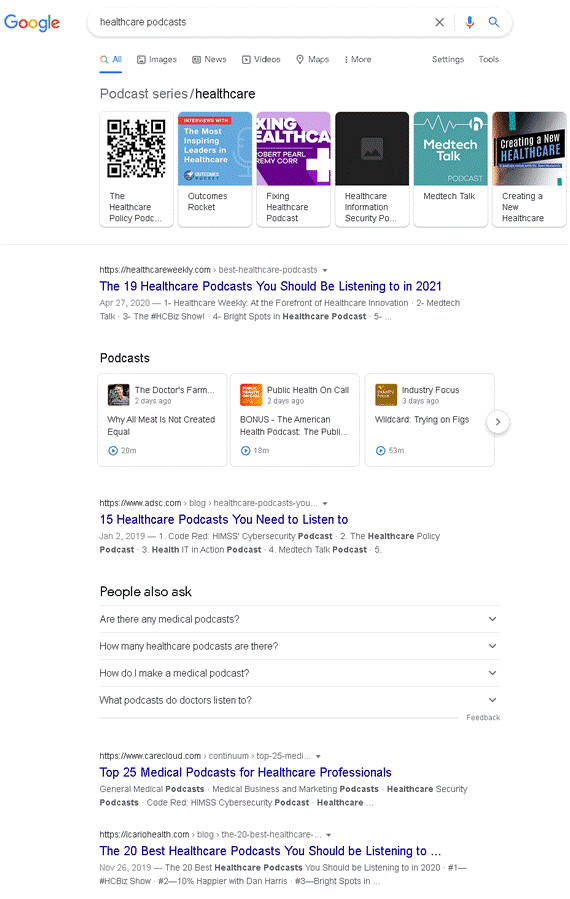
4. HARO
HARO is a well-known online platform that allows journalists to connect with niche experts and get professional advice free of charge. How does it work?
You create an account on HARO. Then you will start receiving requests from journalists on your email address daily. Once you get a list of journalist requests, you will have to review it. Explore those questions you have expertise in.
Answer the questions and wait till your reply is selected. Review the following two suggestions that will help you boost your answers.
5. Make Sure You Are a True Expert
A true expert is a person who earns money by sharing pieces of advice. These people are real influencers within the niche. They have lots of followers who listen to their point of view willingly. So, try to become an expert in your niche if you are not the one yet.

6. Share Your Credentials
Don’t use HARO for link building solely. Experienced journalists can identify SEO professionals quickly. As a rule, journalists don’t want to deal with them at all costs. Thus, to gain journalists’ affection, you should share your credentials. It will help them understand that you are a niche expert.
7. Create PR Campaigns
The goal of the PR campaign is to get your brand featured in the news. Unfortunately, if your campaign isn’t newsworthy, you won’t get positive results.
To make your PR campaign newsworthy, you need to create content that engages with the audience. It should bring out emotions and communicate with people.
8. Attend Trade Shows

It is pretty popular to attend trade shows these days. Businesses consider trade shows as a platform where they could introduce their product or service to the masses. Besides, journalists attend trade shows as well. Plus, it creates a splendid opportunity for business owners to build awareness around the brand.
Your task is to get journalists interested in the product you’re presenting. Do you want to know how to attract journalists’ eyeballs to your brand?
First of all, don’t try to impress journalists but find touchpoints with the audience. Show people how your product can solve their issues. If you sell SEO tools, you should demonstrate an SEO toolkit and how it helps improve the SEO performance of the website.
This approach of your presentation shows that your company knows about the audience issues. Your service is here to help them. So, talk about your brand and create awareness about it.
9. Create Product Reviews With Journalists
The last but not least earned media channel is product reviews. Product reviews are the most straightforward way of brand promotion. It requires you to get in touch with journalists and ask them to test your product. Afterward, they will write a product review.
The question is how to find journalists? First and foremost, analyze product reviews of your competitors. Let’s say your company creates software solutions for coworking space owners. A few leading players on the market suggest the same – Cobot, OfficeRnD, and Nexudus.
The next step is to find third-party web resources that provide a product review of these services. Go to the Content Explorer tool from Ahrefs and run the analysis. Type this query “[competitor] AND [competitor]” into a search bar and rip the benefits. Skim through the list and find the most promising opportunities.
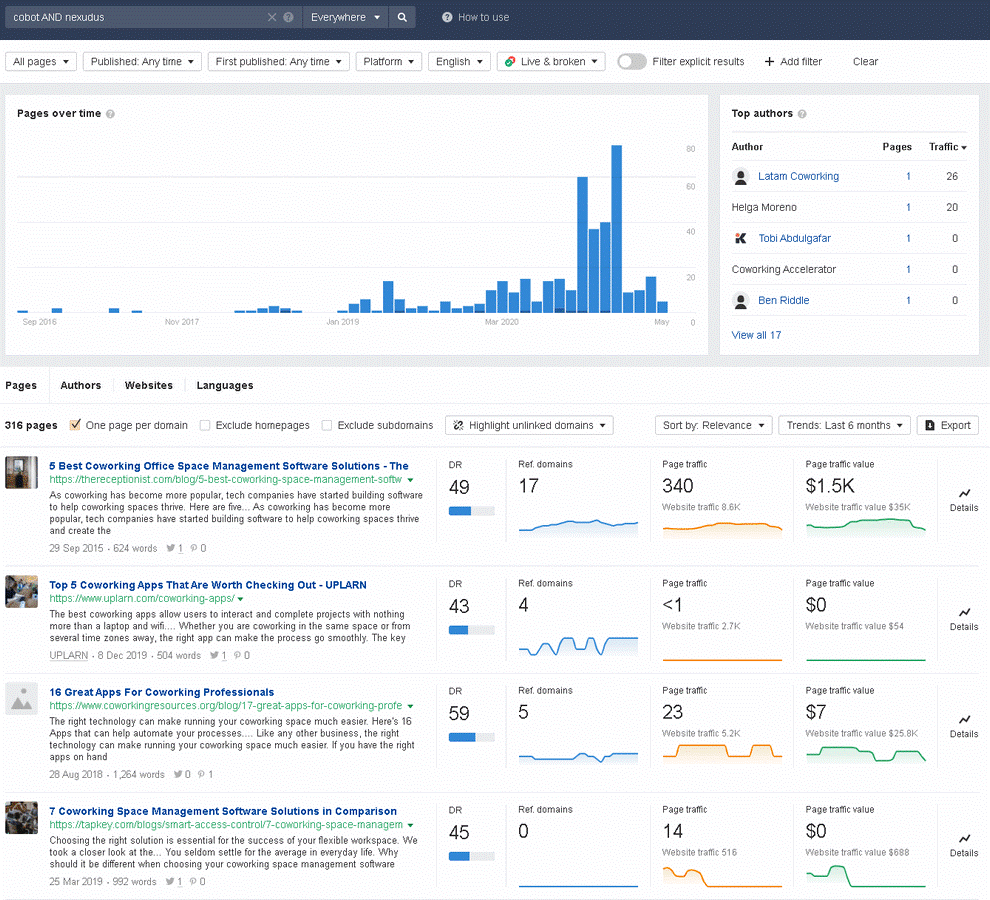
To Sum Up
Earned media is all about building a reputation around your brand, which is impossible to buy. You can’t keep it under your control, either. You will have to deserve it. It requires you to do a lot of work.
Plus, make sure that you suggest a product that solves the issues of your audience. Otherwise, you won’t be able to succeed with the help of earned media channels. If you think this post lacks more tips on earned media, feel free to share your thoughts in the comments.